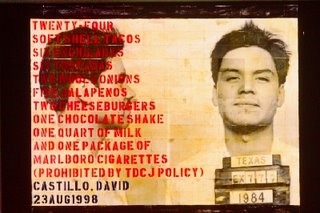Derrick Frazier, a 28-year-old black man, is scheduled for execution on August 31, 2006 for the 1997 murder of Betsy Nutt and her son, Cody, both white.
Urge Gov Perry to Stop the Execution of Derrick Frazier.
Call Texas Governor Rick Perry at (512) 463-2000 or Fax him at (512) 463-1849. For more information, visit www.hasanshakur.com.
Come to the Governor’s Mansion in Austin or one of the protests sites in the list of cities below to protest the Texas death penalty every time there is a scheduled execution.
Statewide Execution Vigils/Protests
Huntsville – Corner of 12th Street and Avenue I (in front of the Walls Unit) at 5:00 p.m.
Austin – At the Governor’s Mansion on the Lavaca St. side between 10th and 11th St. from 5:30 to 6:30 PM.
Beaumont – Diocese of Beaumont, Diocesan Pastoral Office, 703 Archie St. @ 4:00 p.m. on the day of an execution.
College Station – 5:30 to 6 PM, east of Texas A &M campus at the corner of Walton and Texas Ave. across the street from the main entrance.
Corpus Christi – at 6 PM in front of Incarnate Word Convent at 2910 Alameda Street
Dallas – 5:30 pm, at the SMU Women’s Center, 3116 Fondren Drive
Houston – St. Paul’s United Methodist Church, 5501 Main Street (corner of Binz). Parking is available in the church parking lot on Fannin.
Lewisville – St. Philip the Apostle Catholic Church, 1897 W. Main Street. Peace & Justice Ministry conducts Vigils of Witness Against Capital Punishment at 6:00 pm on the day executions are scheduled in Texas.
McKinney – St. Gabriel the Archangel Catholic Community located at 110 St. Gabriel Way. We gather the last Saturday of the month between 6:00 to 6:30 to pray for those men/women scheduled to be executed in the next month.
San Antonio (Site 1) – Archdiocese of San Antonio, in the St. Joseph Chapel at the Chancery, 2718 W. Woodlawn Ave. (1 mile east of Bandera Rd.) at 11:30 a.m. on the day of execution. Broadcast on Catholic Television of San Antonio (Time-Warner cable channel 15) at 12:30 p.m. and 6:30 p.m. on the day of execution.
San Antonio (Site 2) – Main Plaza across from Bexar County Courthouse and San Fernando Cathedral – Noon
Spring – Prayer Vigil at 6 PM on evenings of executions at St Edward Catholic
Community, 2601 Spring Stuebner Rd for the murder victim, for family and friends of the murder victim, the prison guards and correctional officers, for the family of the condemn man/woman, for the man/woman to be executed and to an end to the death penalty.











